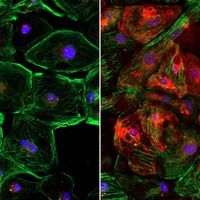heart cells

Emerging from Silence: Capturing the First Heartbeat
Danielle Gerhard, PhD | Sep 27, 2023 | 5 min read
In the developing zebrafish, a noisy and asynchronous activity jumpstarts the heart’s journey to coordinated beating.

Scientists ID Heart-Damaging SARS-CoV-2 Protein
Grace van Deelen | Nov 22, 2022 | 3 min read
In flies and mice, a viral protein increases the rate of energy use by heart cells. But it’s not yet clear if the finding applies to humans.

CAR T Cells Mend Broken Mouse Hearts
Sophie Fessl, PhD | Jan 6, 2022 | 4 min read
Specialized immune cells generated in vivo reduce cardiac scar tissue in mice, a new study shows.

Blood Pressure Meds Point the Way to Possible COVID-19 Treatment
Ashley Yeager | Apr 2, 2020 | 7 min read
There is little evidence that antihypertensive drugs worsen COVID-19, and scientists are instead exploring the idea that such medications—or their downstream effects—may actually alleviate symptoms.

Genes that Are Harmless on Their Own Cause Disease When Combined
Chia-Yi Hou | Sep 1, 2019 | 3 min read
A case study of a family demonstrates that different genetic mutations from the two parents cause severe heart disease symptoms in the children.

Image of the Day: Dystrophin Restored
Carolyn Wilke | Mar 21, 2019 | 1 min read
CRISPRed heart muscle cells from humans gain the ability to make a protein missing in Duchenne muscular dystrophy.

Image of the Day: Taken to Heart
Carolyn Wilke | Mar 14, 2019 | 1 min read
By zooming in on a developing mouse heart, scientists are studying whether defects in vasculature contribute to a thin muscle wall.

Image of the Day: Scarred Hearts
Ashley Yeager | Dec 4, 2018 | 1 min read
Maps of diving cells before and after heart attacks in mice offer additional evidence against the existence of cardiac stem cells.

Adult Cardiac Stem Cells Don’t Exist: Study
Diana Kwon | Sep 5, 2018 | 3 min read
A mouse study adds to the growing body of work disputing the ability of progenitor cells to regenerate muscle tissue in adult mammals’ hearts.

Muscle Master: Angela Dulhunty
Anna Azvolinsky | Sep 1, 2018 | 9 min read
Having pioneered the study of muscle physiology in mammals, she uncovered how ion channels enable muscle movement.

Image of the Day: 3-D Nanofibers
The Scientist and The Scientist Staff | Mar 7, 2018 | 1 min read
Researchers created a nanofibrous scaffold to see how it supports cell growth.

Image of the Day: Un-break My Heart
The Scientist | Aug 8, 2017 | 1 min read
A failing heart is easily distinguished from a healthy one by numerous tell-tale signs, including its slender, stretched-out walls, increased size, and pooled blood clots.
